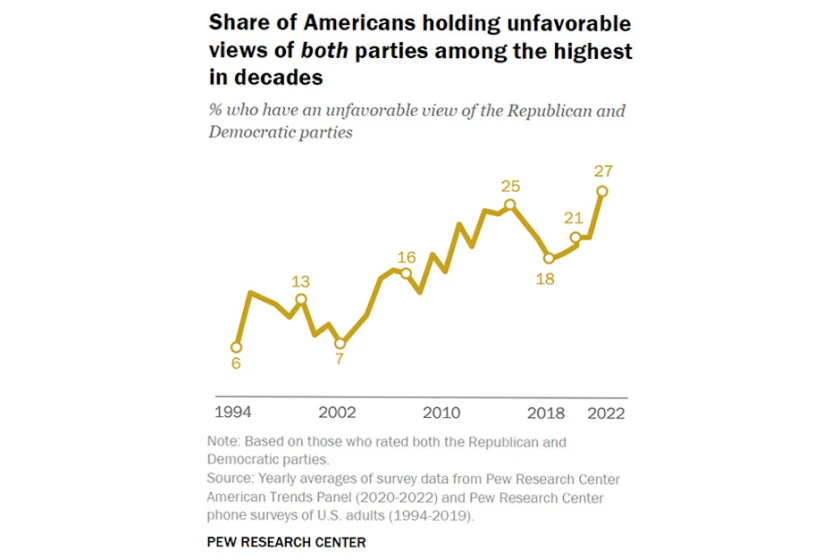Republished with permission from Governing Magazine, by Carl Smith
- A comprehensive review of a decade of research on polarization in the U.S. challenges a widely accepted “truth” that Americans are almost irretrievably divided.
- A key finding is that among themselves, Americans have much more in common than they do with divisive candidates and positions currently favored by party leaders.
- Recognizing and understanding this dynamic can point the way out of unproductive, anti-democratic behavior.
Political operatives know how to get under your skin. Bad actors — often those in leadership positions — feed on emotions to make you feel isolated, alienated and somehow at enmity with people who are otherwise pretty much like you. Good actors are working to catch up in what they characterize as a high-stakes gambit for the future of our democracy.
Rachel Kleinfeld has made a career of shoring up potential cracks in democracy, working in the U.S. and around the world at the “intersection of democracy and security.” She’s the co-founder and past director of the Truman National Security Project, created during the Iraq war to advance policies that encompass human rights and rule of law as well as national security.
Now a senior fellow in Carnegie’s Democracy, Conflict and Governance Program, she remains engaged in a range of pro-democracy efforts, including service on the boards of the National Endowment for Democracy and States United for Democracy, and as a member of the National Task Force on Election Crises.
Carnegie has just published a paper from Kleinfeld, Polarization, Democracy, and Political Violence in the United States: What the Research Says. It offers a detailed view of research on polarization, and what has been learned about the interplay between public attitudes, politics and political violence.
“Americans are not as ideologically polarized as they believe themselves to be,” she finds, but emotions are being polarized for political purposes, leading to new levels of threats against state and local officials. “That makes it even more pertinent to get a handle on what’s going on and what we can do about it,” Kleinfeld says.
Governing: What did you learn about polarization in America that differs from “common knowledge” about it?
Rachel Kleinfeld: Most people think Americans of different parties hold radically different views, and that’s not true. There’s a lot of overlap in what Americans from both parties think, although they differ in intensity.
For instance, Democrats care a lot about gun control. Republicans have similar views on a lot of gun issues, they just don’t rank them as high in their issue set.
The real difference in viewpoints is in who we elect as leaders. Party leaders have almost no issues in common. That’s making it very difficult to govern.
Governing: What’s to be done about that?
Rachel Kleinfeld: Party leaders have been selecting more extreme candidates for some time now — Democrats by maybe two to one and Republicans by a 13 to one margin, according to one study. Party leadership is playing a big role in how extreme our candidates are getting ideologically.
Dealing with that has to do with changing incentives.
Some of us are looking at things like getting rid of primaries and having ranked-choice voting, the way they’ve done it in Alaska, to create incentives for people to run in a less extreme way. Other academics are looking at things like proportional representation to try to get extremes out of politics.
Voters are not getting the choices they deserve, when we look at the difference between their beliefs and the beliefs of elected leaders.

Out of options: More and more Americans don’t have a favorable view of either party. (Pew Research Center)
Governing: Who’s likely to be incited to political violence?
Rachel Kleinfeld: Most people think rabid partisans are most likely to commit political violence, but that’s not how it works at all. Most strong partisans are pretty attached to democracy. They just have very strong beliefs about those policies.
Political discourse, especially on the right, is normalizing violence, saying it’s OK, part of political life. That’s setting off people who might once have been violent in a non-political way.
People who have problems with impulse control are hotheaded, quick to react. They’re often not very polarized at all.
Governing: How dangerous is uncivil speech from candidates and political leaders?
Rachel Kleinfeld: It’s easy for people to think that speech is unimportant; a joke is just a joke, and we shouldn’t take it so seriously.
But all the research shows that it’s dangerous when politicians turn opponents into enemies, particularly if they use language that paints another group as threatening and belittle that group at the same time.
This tells these more aggressive, impulsive people in our society, “Hey, you can target this group. These are the ones to go after. They’re too weak to hit you back.”
Jokes are particularly problematic because they slide past our rational brain. People are more likely to forward something that’s a joke, a meme or an image than to say that thing rationally. They might not believe in violence, but they might send around a funny image that is violent and normalizes it.
Governing: How important is it for leaders from both parties to condemn divisive rhetoric?
Rachel Kleinfeld: I can’t emphasize enough how much we need our politicians to speak against violence, against threats and to speak for the basic functioning of our democracy, such as our elections being valid.
All the studies show that politicians are stand-ins for what is popular and “OK” for their political group. As we’re more and more tribalized into political groups, people look to politicians for what’s normal.
Threats are getting severe enough that they are deterring people from taking elected and appointed jobs, especially things like school board and city council, the grass roots that we need to function. We can’t run a democracy if good people don’t run for office.
Governing: What part does social media play in all this?
Rachel Kleinfeld: Everyone likes to hate social media, but you need to look at the total media landscape. In countries where there’s no other media, it has been tremendously problematic and polarizing. You get real violence in places like Sri Lanka.
In places where you have a good, trusted media source like the BBC [in the U.K.], or strong local media, social media has been a positive force. Most people don’t pay much attention to news on it. They just want to get in touch with their friends, and it puts them in touch with people with different ideas.
In America, we have a very unhealthy media landscape. We have no trusted media of record, and our local media has been dying. Social media plays an echo chamber role in an environment of vitriolic cable TV and radio talk shows, but it’s not acting alone.
Governing: If emphasizing division helps media outlets get clicks and political campaigns get funds, how do we wean them away from it?
Rachel Kleinfeld: There’s some pretty good research coming out from the Polarization Research Lab showing that negative campaigning actually doesn’t work, for all that politicians seem to be attached to it. It’s worse for your political strength. It backfires.
Newspapers, and media in general, tend to think that “if it bleeds, it leads.” They look for polarizing stories. They report on the horse race of politics, and they say that that’s what people click on. The Solutions Journalism Network has found quite the opposite — if you offer people better quality news, more complex stories, people like it. It’s just that they’re not being offered it.
It’s time for our media and political landscapes to realize that they’re turning off many people. They’re only looking at a small slice of their market. They could be doing much better.
Governing: How can state and local governments help move things in the right direction?
Rachel Kleinfeld: State and local government affects issues that matter the most to people. They’re the most important levels of government. If they can show that government works, that government works better when people who have different ideologies come together for mutual goals, that could be game-changing for rebuilding trust in America.
People don’t want to be hateful and divisive and untrusting. They’re that way because they’re being told that nothing works, and they’re getting frustrated with the systems.
When the [Electoral Count Reform Act] was passed with bipartisan support, we got some media stories saying, “Look, we can get things done and it can be done in a bipartisan way.”
We just need a lot more of that.

Governing
The Phoenix is a nonprofit news site that’s free of advertising and free to readers. We cover state government and politics with a staff of five journalists located at the Florida Press Center in downtown Tallahassee.
